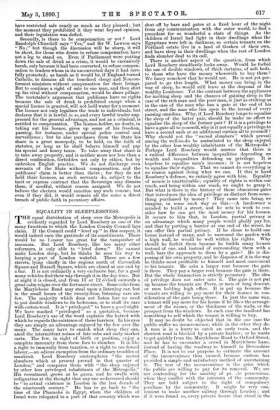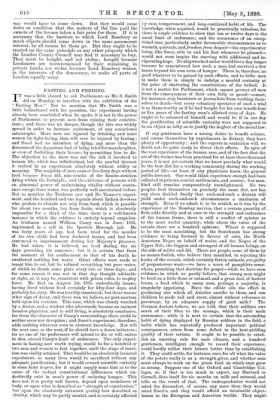EQUALITY IN SLEEPLESSNESS. T HE equal distribution of sleep over the
Metropolis is evidently regarded by Lord Rosebery as one of the many functions to which the London County Council lays claim. If the Council could " level up " in this respect, it would indeed earn the gratitude of its constituents. There would be no I onour too great for the vanquisher of insomnia. But Lord Rosebery, like too many other reformers, is only able to " level down." He cannot make London sleep, but he thinks he sees his way to keeping a part of London wakeful. There are a few streets, lying chiefly in the regions north of Cavendish Square and Russell Square, which are closed at one end by a bar. It is not ordinarily a very exclusive bar, for a good many vehicles find their way through it in the day time. But at night it is closed, and from 11 or 12 o'clock onwards a great calm reigns over the fortunate street. Some echo from the Marylebone Road may steal upon a listening ear, but in the small hours of the twenty-four, listening ears are few. The majority which does not listen has no need to put double windows to its bedrooms, or to stuff its ears with cotton-wool. It is " privileged " to have a good night. We have marked " privileged " as a quotation, because Lord Rosebery's use of the word explains the hatred with which he regards the existence of these barriers. In his eyes they are simply an advantage enjoyed by the few over the many. The many have to snatch what sleep they can, amid the intermittent noises of late cabs and early market carts. The few, in right of birth or position, enjoy a complete immunity from these foes to slumber. It is like a right to immunity from taxation, or a right to use forced labour,—an odious exemption from the ordinary troubles of mankind. Lord Rosebery contemplates " the sacred slumbers which at present prevail in that quarter of London," and compares them with " the sleep enjoyed by other less privileged inhabitants of the Metropolis." His resentment grows as he gazes, and he swells with indignation at the thought that any one so favoured should be " in actual existence in London in the last decade of the nineteenth century." He has to go back to " the time of the Pharaohs in Egypt, when the children of Israel were relegated to a part of that country which was shut off by bars and gates at a fixed hour of the night from any communication with the outer world, to find a precedent for so wonderful a state of things. As the children of Israel had light in their dwellings when the Egyptians were left in darkness, so certain tenants on the Portland estate live in a land of Goshen of their own, and have sleep in their dwellings when the rest of London finds slumber deaf to its call.
There is another aspect of the question, from which Lord Rosebery steadfastly looks away. Would he forbid the use of double windows, of thick curtains, of soft beds, to those who have the money wherewith to buy them ? We fancy somehow that he would not. He is not yet pre- pared to go this length. What money can bring in the way of sleep, he would still leave at the disposal of the wealthy Londoner. Yet the contrast between the appliances for inviting sleep and the chances of gaining sleep in the case of the rich man and the poor man, is just as striking as in the case of the man who has a gate at the end of his street, and the man who lies open to the inroad of every passing omnibus. Why, if Lord. Rosebery longs to equalise the sleep of the latter pair, should he make no effort to equalise the sleep of the former pair ? If it is a privilege to have a gate all to yourself, why is it not equally a privilege to have a second sash or an additional curtain all to yourself ? Why should not the " sacred slumbers " which prevail among the well-to-do be assimilated to the sleep enjoyed by the other less wealthy inhabitants of the Metropolis ? Perhaps Lord Rosebery would answer that there is a radical difference between inequalities depending on wealth and inequalities defending on privilege. It is hopeless to equalise men's incomes ; it is not hopeless to equalise their rights. That we cannot do everything is no reason against doing what we can. If this is Lord Rosebery's defence, we entirely agree with him. Equality of means is unattainable ; equality of rights is within our reach, and being within our reach, we ought to grasp it. But what is there in the history of these obnoxious gates that introduces the idea of privilege as distinct from some- thing purchased by money ? They came into being, we imagine, in some such way as this :—A landowner is minded to build a street, and he sets to work to con- sider how he can get the most money for his" houses. It occurs to him that, in London, partial privacy is an advantage which many people would gladly pay for, and that by putting a barrier at one end of the street, he can offer this partial privacy. If he chose to build one house instead of many, and to surround the garden with a high wall, he would be well within his rights. Why should he forfeit them because he builds many houses instead of one, and instead of surrounding them with a wall, bars the approach to them by a gate ? He is dis- posing of his own property, and he disposes of it in the way he thinks most profitable to himself and most convenient to his tenants. He asks a larger rent because the gate is there. They pay a larger rent because the gate is there. But the whole transaction is strictly pecuniary. The idea of privilege does not enter into it. The gate is not put up because the tenants are Peers, or men of long descent, or men holding high office. It is put up because the tenants are willing to pay more for their houses in con- sideration of the gate being there. In just the same way, a tenant will pay more for his house if he likes the arrange- ment of the rooms, or the thickness of the walls, or the prospect from the windows. In each case the landlord has something to sell which the tenant is willing to buy.
It may no doubt be objected that in the one case the public suffer no inconvenience, while in the other they do.
A man is in a hurry to catch an early train, and the shortest road is blocked by a private barrier; or he wants to get quickly from the Marylebone Road to Oxford Street, and he has to encounter a crowd in Marylebone Lane, instead of having the roadway to himself in Devonshire Place. It is not to our purpose to estimate the amount of the inconvenience thus caused, because custom has provided a simple and satisfactory method of ascertaining it. The test of the inconvenience is the price which the public are willing to pay for its removal. We are not contending for the sanctity of pr. ...te possessions, when they conflict with the interests of the community.
They are held subject to the right of compulsory purchase by the community. It might be very con- venient to make another railway through London ; and if it were found so, every private house that stood in the way would have to come down. But they would come down on condition that the makers of the line paid the owners of the houses taken a fair price for them. If it is necessary that the barriers to which Lord Rosebery so much objects should come down in the same paramount interest, by all means let them go. But they ought to be treated on the same principle as any other property which the London County Council may find it necessary to buy. They must be bought, and not stolen ; bought because Londoners are inconvenienced by their remaining in private hands, not stolen because Lord Rosebery wishes, in the interests of the democracy, to make all parts of London equally noisy.







































 Previous page
Previous page